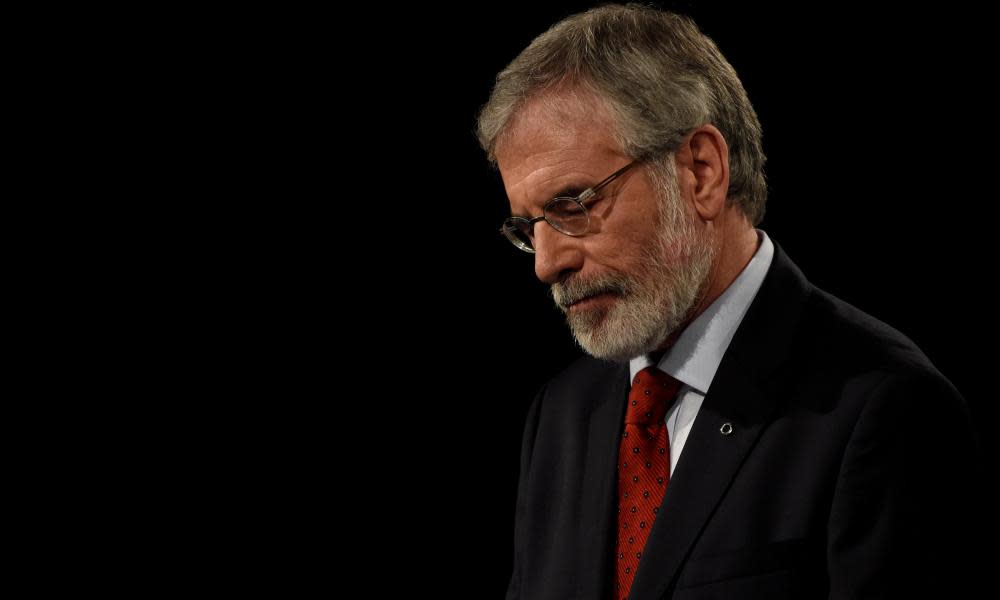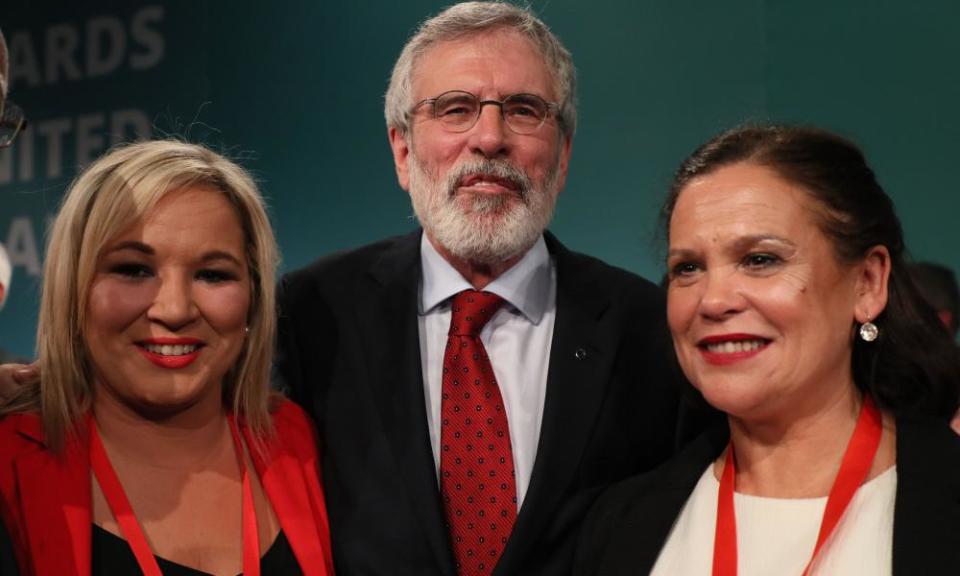Search for new Sinn Féin leader begins after Gerry Adams steps down

Sinn Féin is starting the process of selecting its new leader after Gerry Adams announced he was stepping down after 34 years in charge.
The Irish republican party’s leader in the deadlocked Northern Ireland assembly, Michelle O’Neill, has ruled herself out of the running to succeed Adams, who played a pivotal role in shifting the IRA to a permanent ceasefire in the 1990s and nudged Sinn Féin towards embracing power sharing with their former unionist enemies in Northern Ireland.
O’Neill said on Sunday that she had “enough to do” to even consider putting herself forward as a candidate for Sinn Féin president.
She said she was focused on tackling “the problems in the north” such as the 10-month-long absence of power sharing in Belfast to think about succeeding Adams. “We will see who puts their name forward and then I will obviously make my decision on who I’d support at that time,” O’Neill said
The frontrunner remains the Sinn Féin deputy leader, Mary Lou McDonald.
Following his resignation speech Dublin on Saturday, Adams spoke on Sunday of his relief in also standing down as a Dáil deputy for the border constituency of Louth.
On his time in the Irish parliament, Adams said: “I won’t miss it at all. I think it’s a small cosy little club. I think it has all of the worst aspects of the old British system ... I can tell you, it would fry your head to listen to the nonsense that is talked.”
During the Sinn Féin conference at which Adams announced his resignation delegates voted in favour of allowing the leadership to enter into a cross-party coalition in Dublin even as the junior partner in government.
The two largest parties in the state, however – Fine Gael and Fianna Fáil – on Sunday rejected any notion that they would opt to share power with Sinn Féin.
There had been speculation that Adams would use his semi-retirement to run next year for the presidency of Ireland. Last weekend, however, he ruled himself out of a contest that had proved to be particularly brutal and bruising for Martin McGuinness back in 2011. During the presidential campaign McGuinness faced constant questions about the legacy of IRA violence and his own role in atrocities during the Troubles.
Meanwhile, Irish republican dissidents opposed to the peace process and power sharing in Northern Ireland have said they hope Brexit will be “hell” for Ireland and Britain.
Brexit will boost the dissident republican cause by constantly reminding the Irish people that Ireland remains partitioned, the political party aligned to the New IRA and other armed factions has said.
The leader of Saoradh – the party founded last year to give different strands of anti-ceasefire republicanism a political voice – told the Guardian that “England’s Brexit difficulties will be Ireland’s opportunity”.

The former IRA prisoner Davy Jordan claimed the Tories had via Brexit “driven their beloved Britain to the point of fracture” including the resurrection of the Scottish independence question.
In a speech to more than 100 Saoradh delegates, two-thirds of whom were under the age of 40, at their annual conference in Derry this weekend, Jordan said: “That which weakens Britain is good for Ireland. Let us hope that Brexit is as hard as hell and helps us usher in the demise of the last section of the cruel British empire.
“Let me be clear on the point of Brexit, the debate about soft and hard borders is a distraction from a revolutionary perspective. We are denied our sovereignty by both Britain and the European Union. That which weakens both is to be welcomed; that which strengthens the republican position is to be welcomed.”
Following his speech the ex-IRA prisoner, who served three separate sentences in jails in both Northern Ireland and the Irish republic, said: “There is an artificially imposed border on Ireland and Brexit at least makes people remember that it is still there. Brexit clarifies that the border still exists and that our country is still partitioned by the British.”
Jordan admitted that a chaotic Brexit was “good for the republican position” because it shows to the world that the Good Friday agreement has not erased that border.

 Yahoo News
Yahoo News 
